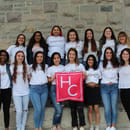Interview with Founder of the Eden Resource Center: A Campus Resource to Redefine Wellness
As the academic year comes to an end, it is important that the Virginia Tech community reflect on the past year, with successes and continued growth. This year, many mental health organizations made a difference on campus, including a new organization, founded by Kevin Pei, the Eden Resource Center. I got the chance to catch up with Kevin and learn more about the organization he started, stemming from personal experience with the loss of his girlfriend, Torey.
-
To start, can you tell me what the Eden Resource Center is? Who is the center intended for, and what inspired you to start it?
“The Eden Resource Center ultimately strives to be a one stop shop for information/suggestions on wellness resources in the NRV. But as of now, we’re just focusing on mental health. I have personally witnessed the process of seeing Torey try to get the help she needs, and I have personally experienced it as I tried to get support through my grieving process. That being said, I’ve seen that the process of receiving effective health services is unnecessarily indirect. People should not have to spend so much time, effort, and resources just to find something that doesn’t work.
The ERC is primarily intended for Virginia Tech students, specifically targeting freshmen, who tend to go through a lot of mental health issues due to the drastic transition to the “real world”. We would love to eventually expand to NRV high schoolers and other nearby students. The journey of my girlfriend trying to get mental health services, as well as her suicide, inspired me to start the ERC.
The primary goal of the ERC is to direct students to health resources/services that are compatible to their needs/situations. To do so, we will have direct information on each service, comparing them. Some of our other goals involve eliminating the stigmas around mental health, so students may seek to PREVENT these issues from arising. Typical health services put significant effort on a REACTIVE approach, rather than a proactive one.
We also want to bring more student organizations together to be a unified voice for change on campus. We are planning to work with Active Minds, Division of Student Affairs, Hokie Wellness, service fraternities, and several other wellness organizations as well.”
2. How would you define your mission, with a simple statement?
“Through a “for the students, by the students” approach, our mission is to provide direct, accessible, and trustworthy information on mental health resources for students in the New River Valley.
From our Facebook page: “At Eden Resource Center, we strive to redefine wellness with a holistic and proactive approach to well-being. We view “wellness” as a multi-faceted concept – it is not just defined in the gym. Wellness encompasses many other areas such as mental, academic, financial, and social well-being. People should have easily accessible resources to improve their wellness. Students should not have to spend excess time, efforts, and resources, just to discover that a certain resource is not compatible in alleviating the discomfort of their given situation. Our goal is to provide direct, reliable, and comprehensive information on wellness resources in the New River Valley, starting with mental health.”
3. How has the experience of creating the center been? Have you faced any challenges? What are they?
“The experience of creating the ERC has been amazing, it’s so awesome to receive as much support as I’ve been getting. It’s even more exciting that the ERC’s potential is recognized by students and Virginia Tech health/wellness staff. The logistics side of things, especially with T-shirts has definitely been challenging. I have so many ideas on what I want the ERC to do. I have a rough idea of what I want the final product/website to look like, but the steps to get there are sometimes foggy and unclear. That being said, I’m extremely fortunate to have the team that I have now.
Although it is just myself and three others as of now, doing ALL of this myself while balancing academics, work, and my personal processing of Torey’s death, would be seemingly impossible. So a major challenge I am currently facing is recruiting a team of passionate individuals so I can delegate more. It has been challenging to find people who want to get involved in mental health change for OTHERS and the future Virginia Tech community. I’m taking a huge mental break over the summer, I’m not worrying about internships or stressing about classes, so it’ll be a great time for me to put in more work with the ERC.
My future plans are to connect to more student organizations to recruit ERC team members and to simply promote our cause. Virginia Tech has so many passionate individuals, we just need to bring them together and find those willing to help with the ERC. With an increase in awareness and workforce, I will be able to delegate significantly more, and the ERC will be able to expand its influence.
So basically the two main challenges as of now are: 1. Managing everything with my already busy schedule, which is why I need more team members to delegate 2. Finding team members and support (on the ideas/collaborating side of things, not necessarily financial)”
4. What organizations are you hoping to partner with for programs with the center?
“We’d like to partner with Active Minds, Dan’s Bandanna Project, as well as service fraternities. I also hope to collaborate with various cultural student orgs such as ESA and VSA because I think it’s extremely important to get perspectives from students of all backgrounds and life experiences. We also plan to work with Crossfit 460 (I work there) and other fitness organizations to tie in how other facets of wellness, such as physical well-being in this case, are so important for one’s mental health.”
5. What do you think the biggest thing students can do to support mental health initiatives is?
“BY FAR the most important thing that students can do is to SPEAK UP. I think it’s extremely important for students to express their opinions on mental health services on campus because it directly affects them. If they don’t speak up, how will other organizations know what to change? To me and the ERC, hearing and sharing different perspectives/stories of student experiences with mental health is one of our biggest motivators. Mental health is different for every single person – we all react to stress and anxiety in different ways. That being said, mental health services should NOT approach mental health in a cookie-cutter way. Students should be able to find resources COMPATIBLE with their needs.”
6. In the same area, what do you think is the most helpful thing that Virginia Tech as a university can do to support mental health initiatives?
“VT MUST listen to the student voice. They should encourage students to speak up and also LISTEN to the students. Every voice matters, because for every voice, there is a story or possibly even a struggle with that person and their mental health. In my personal experience, the most powerful perspectives come from experiencing the matter first-hand. Administration can not effectively form initiatives and programs without considering the student perspective in major detail. How are the faculty and staff supposed to create effective programs FOR STUDENTS if they cannot relate to the struggles and hardships of STUDENTS? Virginia Tech must listen to what students need and want. I also think it’s important for Virginia Tech to take a more proactive approach to mental health treatment. No matter how many new counselors we hire, THERE IS STILL AN UNDERLYING ISSUE. Adding more counselors are simply treating the symptoms. Virginia Tech must focus on or at least support an upstream approach to mental health, preventing unnecessary stress, anxiety, and other mental health disorder precursors from occurring in the first place.”
7. Why would you say stigma exists regarding mental health? What is your personal opinion on the best ways to combat stigma?
“I think mental health stigmas originate from the views of traditional families and general fear of judgment. In my experience, a lot of different cultures have different views of depression/anxiety, many of which are negative. In many cultures, depression or even suicide may be shown as a sign of weakness. I also think that there are stigmas behind mental health due to people scared of being perceived as weak! Especially with adolescents/students, where perception and public image is unnecessarily important to a lot of people, being perceived as weak may mean a lot to them. In my personal opinion , the best way to combat the stigma is to promote resources. No matter how good educational/informational flyers, videos, or handouts are, if people aren’t reading them in the first place it does not matter. If organizations could look into the psychology of how people associate mental health with certain stigmas, and then attack that association, we could potentially reduce the effects of those stigmas. Another way to combat the stigma is to create associations with mental health and NORMALCY. If students view mental health as a normal thing to treat, just as any other aspect of physical well-being, then people would most likely be less inclined to be scared of potential judgment.
If organizations could also look into the psychology of motivation, to understand WHY students are hesitant to speak up and/or receive mental health services, then it may help increase traffic and attentions towards those resources.”
8. Is there anything else you want our readers to know about you, or the Eden Resource Center?
“I want students to know that their voices matter, they just have to speak up. The ERC wants to know as many perspectives and stories on mental health as possible. In doing so, we can have a greater understanding of the changes needed on campus. I also want students to know that we understand. Being students ourselves, we understand the struggles you may go through on a day-to-day basis, whether it be stressing about internships, future classes, or personal matters.”
Find the Eden Resource Center on Facebook here.
Image Sources:
—
If you or someone you know may be struggling, please take note of the resources available on campus:
-
Cook Counseling Center
-
McComas Hall, RM 240, Virginia Tech 895 Washington Street SW Blacksburg, VA 24061 540-231-6557 Fax: 540-231-2104
-
-
The Women’s Center
-
206 Washington Street SW
-
Blacksburg, VA 24061
(540) 231-7806 Fax: (540) 231-6767
-
Schiffert Health Center
-
895 Washington Street, SW Virginia Tech, McComas Hall (0140) Blacksburg, VA 24061 540-231-6444 Fax: 540-231-7473 or 540-231-6900
-
-
Hokie Wellness
-
195 McComas Hall (0140) 895 Washington Street Blacksburg VA 24061
-
540-231-2233
-
Local Emergency Resources:
-
ACCESS — Emergency services clinicians are available to meet with you at your location. A friend or family member can call for you if you feel that you are unable to do so yourself. Call 540-961-8400.
-
CONNECT — A 24-hour referral and emergency evaluation service of Carillion Health Care. Call 1-800-284-8898 or 540-731-7385.
-
RESPOND — A mental health admittance and referral service of Montgomery Regional Hospital and Lewis Gale Hospital. Call 540-953-5324.
-
Virginia Tech Police — 911 if on campus or 540-231-6411
-
Blacksburg Police — 911 if off campus in Blacksburg or 540-961-1150
-



